In our state, there is a burning issue of disappeared
persons (Arabic = Maqood-ul-Khabar - eans whereabouts of a person
is unknown, whether the person is dead or alive, where is the person?
what he is doing?). If a person has disappeared, he left his children
behind and there is none who can take care of their wellbeing. Shariah
said that we have to understand what is to be done to the destitute.
About 95% of Muslims of the world who follow the directions of Imam- e -Azam
Hazrat Umar-e-Farooq (RA), but some of is directions are not accepted by
some people, not because they are wrong but because it is interpreted by
other schools of thought like Imam– e-Shafi (RA), Imam-e-Malik(RA),
Imam-e-Ahmad bin Hambal. These are basically four schools of thought
which have interpreted Islam and have given their several
interpretations of Shariah. By virtue of our obligation, we have to
abide by all these schools of thought.
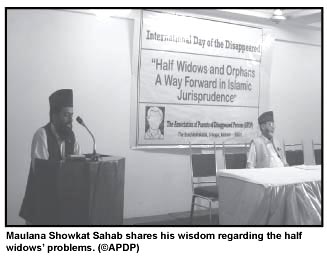 Imam
Azam said that a woman has to wait for ninety years before she remarries
if her husband has disappeared. But the other Imams question the length
of the period. The Imam Maalik’s school of thought provides that if a
married person will be missing for 4 years and there would be no clue of
the person’s status even after proper investigation, then, the Qazia
Shariah or Mufti (religious scholar) will cancel the person’s marriage
and the person would be considered dead, even if the person might still
be alive. When Qazi Shariah will declare the disappeared person as dead,
then the half widow has to wait for four months and 10 days and after
this, she can remarry.
Imam
Azam said that a woman has to wait for ninety years before she remarries
if her husband has disappeared. But the other Imams question the length
of the period. The Imam Maalik’s school of thought provides that if a
married person will be missing for 4 years and there would be no clue of
the person’s status even after proper investigation, then, the Qazia
Shariah or Mufti (religious scholar) will cancel the person’s marriage
and the person would be considered dead, even if the person might still
be alive. When Qazi Shariah will declare the disappeared person as dead,
then the half widow has to wait for four months and 10 days and after
this, she can remarry.
In Jammu and Kashmir, enforced disappearances started
in the 90’s. Thousands of disappeared persons left behind their
relatives, e.g. father, mother, brother, sister, wife and children. "If
the husband of any woman is disappeared, I request her to go to Qazi
Shariah and seek permission for a second marriage. Unless or until a
Qazi would not give his verdict about the whereabouts of the missing
person after proper investigation, a woman cannot remarry.
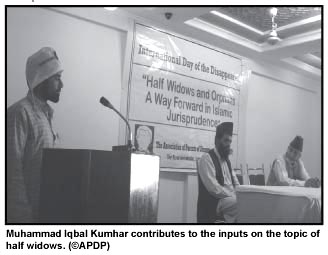 However,
there are state laws as Marriages Acts which provide that a woman has to
wait for seven years since the disappearance of her husband. According
to the Act, a disappeared is declared dead after 7 years of being
disappeared. There is a contradiction between the State law and norms of
Shariah, but according to our religion, norms laid down in Shariah will
prevail over State Laws." "As per the property of the disappeared
person, it cannot be divided or distributed until after ninety years.
But if the person would have children, then the property would be
distributed among them. In case the disappeared person would be living
with his father, under such circumstances, the power of distribution of
property lies with the father. The children of the disappeared cannot
claim property from their grandfather. But if there would be involvement
of other relatives, in that case, the issue of property would be kept
pending."
However,
there are state laws as Marriages Acts which provide that a woman has to
wait for seven years since the disappearance of her husband. According
to the Act, a disappeared is declared dead after 7 years of being
disappeared. There is a contradiction between the State law and norms of
Shariah, but according to our religion, norms laid down in Shariah will
prevail over State Laws." "As per the property of the disappeared
person, it cannot be divided or distributed until after ninety years.
But if the person would have children, then the property would be
distributed among them. In case the disappeared person would be living
with his father, under such circumstances, the power of distribution of
property lies with the father. The children of the disappeared cannot
claim property from their grandfather. But if there would be involvement
of other relatives, in that case, the issue of property would be kept
pending."
Bashir-ud-din further said: "If APDP constitutes a
committee for the welfare of the survivors of the disappeared persons,
we would appeal for people to come forward and donate for the welfare of
the survivors of the disappeared."
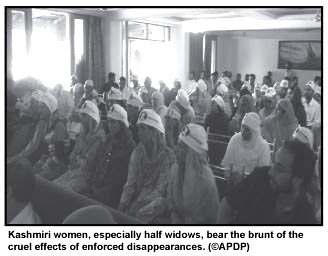 While
speaking about the problems and inheritance rights of half orphans,
Moulan Yaqoob Sahab said: "It is really great that people have the
concern with the destitute. In the Islamic way of life, a person should
not only be concerned with his problems but he should also look into his
surroundings and be concerned with other people’s problems. A person
should contribute to the resolution of the problems of the victimized.
Sahab also appreciated the initiative of APDP in organizing such kind of
seminars and in fighting for the rights of survivors of disappeared
persons.
While
speaking about the problems and inheritance rights of half orphans,
Moulan Yaqoob Sahab said: "It is really great that people have the
concern with the destitute. In the Islamic way of life, a person should
not only be concerned with his problems but he should also look into his
surroundings and be concerned with other people’s problems. A person
should contribute to the resolution of the problems of the victimized.
Sahab also appreciated the initiative of APDP in organizing such kind of
seminars and in fighting for the rights of survivors of disappeared
persons.
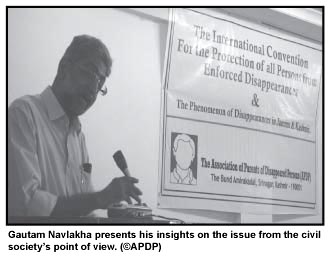 On
inheritance of half orphans, he said: "If a person is disappeared and he
left behind his children, the primary responsibility of taking care of
these half orphans falls on their grandfather. Islam says that the
grandfather has to look after his grandchildren and has to provide them
with all necessary things including education. Ulamas says that even if
the orphans are not entitled to the inheritance of their father’s
property but under such complex circumstances, it is obligatory that a
grandfather has to inherit something in favor of his grandchildren. But
it is sad when their orphans’ grandfathers deprive them of everything
and oust them from their families. This is not permissible in Islam. The
close relatives have to take care of the inheritance rights of orphans.
If a half orphan’s grandfather is dead, the uncles have to look after
and contribute to their education and ensure their good future.
On
inheritance of half orphans, he said: "If a person is disappeared and he
left behind his children, the primary responsibility of taking care of
these half orphans falls on their grandfather. Islam says that the
grandfather has to look after his grandchildren and has to provide them
with all necessary things including education. Ulamas says that even if
the orphans are not entitled to the inheritance of their father’s
property but under such complex circumstances, it is obligatory that a
grandfather has to inherit something in favor of his grandchildren. But
it is sad when their orphans’ grandfathers deprive them of everything
and oust them from their families. This is not permissible in Islam. The
close relatives have to take care of the inheritance rights of orphans.
If a half orphan’s grandfather is dead, the uncles have to look after
and contribute to their education and ensure their good future.
OPEN FORUM
Question 1: Yaseen Malik of Zandfaran Baramullla
and Ashiq Hussain of Natipora Srinagar asked: A half widow remarried 17
years after her husband’s disappearance. But if her first husband would
return, would the woman be wife of the first husband or the second
husband?
Mufti Azam Bashir-ud-din replied: If the half widow
had approached Qazi Shariah and have sought permission for remarriage,
then she would remain the wife of the second husband even if the first
husband would come back after the remarriage. But if the half widow has
remarried without seeking permission from Qazi, the second marriage
would not be valid. The woman would remain wife of the first husband.
Seeking permission from Qazi Shariah is compulsary for remarriage,
otherwise the remarriage would be invalid.
Question 2: Yousuf Kumhar of Banihal questioned:
half-widow with her two children, one daughter and one son lives with
her two brothers-in-law. She has no source of income. Due to such
conditions, the brother of the half widow wants his sister to stay at
her maternal house until her son grows up. But the two sisters-in-law of
the half widow argued that she would be deprived of the property of her
husband if she migrates to her maternal house. Her sisters- in law
argued on the pretext that they have to take care of the half widow’s
property if she stays at the maternal house.
I want the scholar’s (Ulamas) decision on this
matter. I want to know if the half widow will migrate to her maternal
house, will she really be deprived of her property or not?
Mufti Azam Bashir-ud-din replied: If the half widow
is young and insecure at her in-laws’ house, she can stay at her
maternal house along with her children. According to Shariah, the
brother-in-laws of a half widow cannot deprive her from her husband’s
property, even if she prefers to stay at her maternal house.
Question 3: Sajad Ahmad of Alamgari Bazar,
Srinagar asked: If a person has been subjected to enforced disappearance
and his wife has waited for 4 years, 4 months and 10 days and would have
remarried after seeking permission from the Qazi Shariah, but soon after
the remarriage, her disappeared husband who would have been forcibly
disappeared, would come back, can the disappeared person claim his
remarried wife? How will he defend his case of enforced disappearance
before Qazi Shariah?
Mufti Azam Bashir-ud-din replied: Imam Malik (RA) has
said when 4 years would pass and the half widow has no clue about her
husband’s fate, she could approach Qazi Shariah and get a consent for
remarriage. According to Shariah, if four years have passed since the
disappearance of a person, Qazi Shariah could declare the person dead
and then direct his half- widow to wait for 4 months and 10 days if she
wants to remarry. Even though her husband would have been kept under
unlawful detention or whether her husband would be alive at any place or
would have died, her remarriage would be considered valid if she sought
the permission from Qazi Shariah. If her disappeared husband returns
after her remarriage, he cannot claim her as his wife.
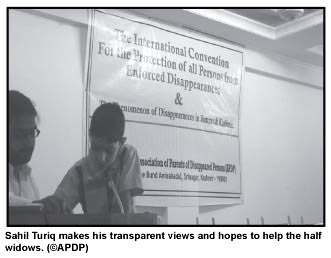 Mufti
Bashir-ud-din, while answering the question, added: "According to legal
norms, a divorced woman remains the wife of the husband who divorced her
until she remarries, but in Holy Quran, it is mentioned that the
divorced woman remains wife of the husband for 3 months and is entitled
to maintenance for the same period of time. Our courts in the matter of
divorce rely on the case ruling of Shah Bano vs. Mohammad Ahmad, where
it was said that a divorced woman remains wife of the first husband till
she remarries.
Mufti
Bashir-ud-din, while answering the question, added: "According to legal
norms, a divorced woman remains the wife of the husband who divorced her
until she remarries, but in Holy Quran, it is mentioned that the
divorced woman remains wife of the husband for 3 months and is entitled
to maintenance for the same period of time. Our courts in the matter of
divorce rely on the case ruling of Shah Bano vs. Mohammad Ahmad, where
it was said that a divorced woman remains wife of the first husband till
she remarries.
There is a contradiction between court orders and the
Shariah decision. If a complication may arise in such circumstances, the
Shariah decision would prevail and preference would be given to it."
Zahirudin suggested that Ulamas contribute a pamphlet containing norms
on rights of survivors of disappeared persons. He suggested that the
pamphlet be published by the Ulamas themselves because the APDP cannot
afford the cost.
International Convention for the Protection of All Persons from Enforced
Disappearance and its Relevance to the Phenomenon of Disappearance in
Kashmir
The session started with the speech of Dr. Altaf,
renowned state pediatrician. Dr. Altaf said: "This part of the program
is about the persons who were forcibly disappeared by security agencies.
As we know from the last 20 years, 8,000 – 10,000 people were subjected
to this crime. If a person disappeared, he leaves behind agonies to his
family members. If he is alive, how is his physical, mental and
spiritual condition? Does he get food? Is he away from calamities? If
the disappeared is in bad health, does he get medication and other basic
facilities? In case the family presumes the disappeared as dead, the
family gets haunted as to how their beloved had died, if he had indeed,
died or was killed, was he tortured, strangulated or shot to death? Were
his last rites performed or not?"
He further said: "If a person is killed, the
suffering remains for a short period of time while if a person is
disappeared, the survivors suffer endlessly and this fact continuously
traumatizes them."
"A lot of work is being done internationally to
bring an end to disappearances. A convention against disappearances has
been passed by the UN in 2006. India has signed this convention but has
not ratified because if it ratifies, there would be pressures if more
disappearances would occur. Internationally, India claims protection of
human beings and zero tolerance to human rights violations. But in Jammu
and Kashmir, India continuously disappears people who demand for their
fundamental rights. We have to campaign so that the Convention would be
implemented and there would an end to disappearances." concluded Dr.
Altaf.
Narrative of Mr. Gautam Navlakha, Editor of Economic and Political
Weekly, New Delhi:
Twenty years of conflict have passed and nothing has
been done about the phenomenon of disappearance in Jammu and Kashmir. It
is only the APDP which is campaigning against the issue and is
disseminating information about the disappeared.
In 2006, the UN Convention for the Protection of All
Persons From Enforced Disappearance was adopted by in the General
Assembly. The Convention provides us an opportunity to campaign more for
justice. The convention explains what is enforced disappearance. How
grave is this violation?
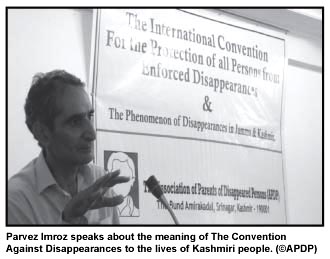 Enforced
disappearance is a crime against humanity and the Convention provides
protection from it. Unfortunately, the APDP cannot evoke this convention
because in Art. 31, it is laid down that the committees constituted for
campaigning against the disappearance cannot file a complaint or forward
information against the country of their origin if the country would not
be a signatory to the convention. But we should not lose hope because
the Convention and other international norms provide us space to take
our issue forward to the international community.
Enforced
disappearance is a crime against humanity and the Convention provides
protection from it. Unfortunately, the APDP cannot evoke this convention
because in Art. 31, it is laid down that the committees constituted for
campaigning against the disappearance cannot file a complaint or forward
information against the country of their origin if the country would not
be a signatory to the convention. But we should not lose hope because
the Convention and other international norms provide us space to take
our issue forward to the international community.
We should not forget that in the UN, the issue of
Kashmir has been registered in 1948. At that time, a resolution was
passed providing that the Kashmiris can decide on their own future,
which signifies the importance of Kashmiris in the UN. However, India
will not agree on the Convention because it has been disappearing people
continuously and have disappeared more than 8,000 Kashmiris in the last
twenty years.
For more than fifteen years, the APDP has been
demanding that the government hold an independent inquiry commission to
investigate cases of disappearance in Kashmir in order to divulge their
exact number and to let the family know the truth. So far, not a single
ruling party has helped because the state government claims that it is
an elected government but in fact, it works on the dictates of the
central government. The state government can arrest or pick up anybody
irrespective of age, involvement or association but cannot release a
single person because the whole power lies in the central administration
of India. Recently, the Home Department of State Government during the
assembly session acknowledged 3,428 cases of disappearance in the state.
There is a judgment which says that the government only claims and
acknowledges those facts which it would have investigated and surveyed
properly. So it is clear that the state government would be having the
records of the 3,428 cases. We want it to provide information on the
fate of these victims.